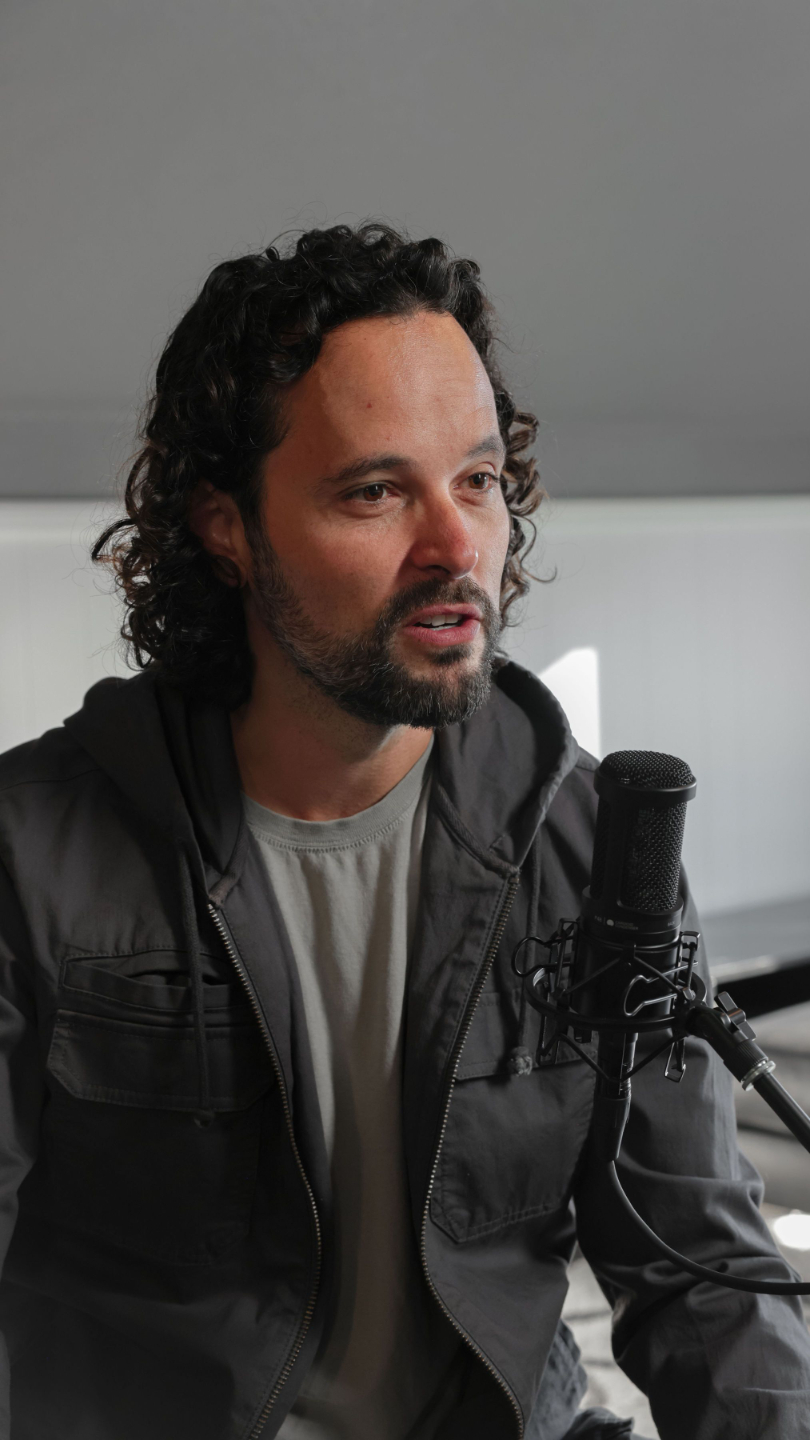You’re Making Progress—Here’s How to Make It Actually Feel Like It’s Working
Stop Fixing—Start Noticing What’s Working
Most men are trained to notice what's wrong. It's what we do. We troubleshoot. We scan for problems. We handle what needs to be fixed.
But when it comes to your marriage, that instinct can backfire because if the only thing you ever look for is what's not working, you'll miss what is. You'll miss the progress, the true connection, the small moments where something different, something better is actually happening and that matters.
So today we're talking about a practice that most men and maybe you overlook, noticing and celebrating the 15% of your marriage that's going well, even if the other 85% is still hard.
We're also going to talk about why that practice isn't just helpful, but actually necessary and how learning to see what's good in your marriage and the progress you're making can be the thing that keeps you going when things feel stuck.
I will also share about why this is how I start every coaching session with the men I work with, and how I use this exact same practice in my own marriage and my own journey of being a better husband.
Stay with me on this one. It's an important topic.
You are listening to Better Husband, the podcast that helps you answer the question, how can I be a better husband? I'm Angelo Santiago, a men's marriage and relationship coach, and every week I bring you insights, stories, and real life tools to help you actually become a better husband.
Why Every Coaching Call Starts with This One Question
Now, every coaching session I do starts the same way.
I ask what went well this week? Not what problems came up, or where did things go wrong? We get to that too, but I always start with a win because in all relationships, even in the hardest weeks, something went better than usual. And most of the time, if a guy's honest, he can name it. Maybe he didn't raise his voice or maybe they laughed during dinner.
Maybe he caught himself just before saying something that would've made it worse. Maybe there just wasn't a big fight this week. It's not always big, but it's always there if you're willing to look for it.
Now, to be honest, most men pause when I ask that they're not used to scanning for what's good. They're used to bracing for what's not. They show up to the session ready to tell me the story about the big moment that went horribly wrong, and ask me what I think they should do about it. They want my opinion, my support, my understanding, and they want my help.
When You Shift from “Nothing’s Working” to “Something Is”
But once they start to look for the good things that happen, they realize the progress is there. It's just been drowned out by the challenging moments and hasn't been acknowledged. And once they start to see their journey to being a better husband, differently from nothing's working to something is getting better.
Well then something shifts. It reminds them that the work that they're doing is actually making a difference, and that's often the fuel they need to keep moving.
What I Didn’t See in My Own Marriage—Until It Was Almost Too Late
For years in my own marriage, my wife and I were disconnected. We weren't necessarily in crisis all the time. We were functioning, we were together, but also kind of not. We had a rhythm. Life kept moving, but emotionally we were far apart. And when things weren't hard, I got stuck in how bad it was. I bought into the story that this was just how marriage was, and I should just be content with the fact that it was good enough.
I wasn't scanning for what was working. I was scanning for what was failing. But now when I look back, when I scroll through old photos or remember different seasons, I can see it differently. There were so many good moments, dinners with family and friends, camping trips together, times where we sat and actually talked about our future phases where we laughed more, held hands, more acted like two people who really loved each other.
Those moments were real. They weren't fake, but at the time I barely noticed them, and I definitely didn't believe that if I put in just a little bit of work, those small moments could turn into what my marriage felt like all the time. Sometimes I wonder what would've happened if I had really appreciated those moments in real time.
If I had used them as energy to invest more, to reconnect, to repair, maybe my marriage wouldn't have gotten to the brink of divorce before I finally started showing up. Maybe that's the opportunity you have now to learn from my mistake, to celebrate the wins you're already having, and to let those wins be the reason to keep showing up and to keep building the marriage you and your wife both want.
Harmony, Disharmony, Repair—And What Most Men Miss
One of the things I talk about a lot inside Better Husband Academy and with the men I coach is the natural rhythm of every relationship. It's not just things are good or things are bad, it's a cycle. You move through moments of connection, then disconnection, and then you repair. We call it harmony, disharmony, repair, and that might sound simple, but for a lot of men, it's a brand new idea because most of us grew up thinking that the goal was to stay in harmony all the time.
No tension, no arguments, no awkward silences, just smooth sailing. So when things don't feel smooth, we assume something's wrong, or we panic, or we pull back and wait for the storm to pass. We either tell ourselves that we screwed up or don't know what to do. Or we blame our partners for what they did and wait for them to apologize.
But here's what I've learned both in my own marriage and from working with hundreds of men. Healthy couples don't avoid disharmony. They just know how to find their way back. And part of coming back is actually recognizing when you've made it back.
Noticing those little resets, those moments where something changes and noticing what you actually did to help in the repair process and celebrating it.
I'm asking you to actually see how as you become a better husband, the disharmony won't fully go away, but the time it takes to repair gets shorter.
The time you spend in harmony gets longer and there are things that you both start doing to stop fights from happening and actually have conversations in a way that you can hear each other. Because if you're always stuck in a fight or waiting for the next one, you'll miss that moment on the couch that felt easy or that morning where she smiled at you for no reason, or that night you fell asleep closer than usual.
Those are the winds and they're just as real as the hard stuff. You just have to notice them.
Why Most Men Miss Their Own Growth
When you don't acknowledge progress, you start telling yourself a story that nothing's changing and that story gets loud. You start saying she doesn't see it, or this isn't working, or Why even bother? And once that story takes hold, it affects how you show up. You put in less effort, you pull back. You wait for something to feel different before you reengage, and that's how a lot of men slowly check out of their own growth now because the work isn't working, but because they never stop to notice that it actually is.
I've seen this over and over. Guys are who are finally slowing down, staying grounded, communicating differently, making real changes, but because their wife hasn't fully responded yet, or she's still stuck in the story that this change isn't real because they still have tension sometimes they think that they've made no progress at all.
They don't see how far they've actually come. But here's the thing, you might be further along than you think. You just haven't allowed yourself to see it. Because it's always easier to see what's still not working.
Progress takes time, progress takes patience and progress deserves celebration. Sometimes it shows up in a softer tone, in a longer pause, and the fact that you recovered from that argument in hours instead of days.
I tell the guys I work with this all the time, even if your marriage is only 15% better right now, it's still better. That 15% matters. You don't wait for the glass to be completely full before you take a drink. If it's 15% full and it used to be empty, then you're heading in the right direction.
That doesn't mean you stop doing the work. It just means that you give credit where credit's due to yourself, to your partner, and to the process. And honestly, this is where some men start to push back. They say things like, isn't that just pretending everything's okay? Or What if she doesn't notice or appreciate it?
I get it. But celebrating progress doesn't mean you're settling for good enough. It just means you're being honest and can say, that was a good moment. You can still want more. You can still do more.
You can still ask for more. But you don't have to ignore what's already changing.
Four Simple Practices to Make Progress Feel Real
So let's talk about what this actually looks like in real life. Here are a few ways to start noticing and celebrating progress today. Number one, name it. At the end of each day, just ask yourself, what was one good moment between us today? That's it. One moment. Number two, I want you to say it out loud.
Even if it feels weird. I want you to say, I really appreciated how we joked around this morning. Or it felt good just sitting on the couch with you last night. Or even just say it out loud to yourself. Look at yourself in the mirror and say, Hey, you did a good job today. You stayed patient. You were kind, you were loving.
You didn't escalate. Number three, you can also write it down. Start a simple note in your phone calling it wins. Or if you have a journal next to your bed, just write this down. One line per day. That's it. What went well today, and number four, acknowledge your own effort. I stayed grounded. I didn't get defensive.
I showed up. I listened well. If no one else notices, it still counts. And if you're raising kids, show them this practice too. Let them hear you. Notice what's good. Maybe this is the exact thing that you needed as a kid, and now you can give it to them and change their future relationships.
There's a reason this works, and it's not just mindset stuff or made up advice.
What the Research Says About Gratitude and Connection
When you take time to notice the good, to speak it out loud, to let it matter, you're actually retraining your brain. You're rewiring yourself to seek connection faster, to watch those moments before they pass you by, and to build new patterns of trust and closeness over time.
This isn't theory, it's been studied. There's a 2015 study from the Journal of Social and Personal Relationships that found that couples who consistently expressed appreciation toward each other had stronger relationships, better conflict recovery, and higher long-term satisfaction. Another study out of the University of Georgia found that gratitude was one of the strongest predictors of marital quality, stronger than communication style, stronger than income, stronger than shared interest.
Why? Because gratitude builds goodwill and intimacy. It shifts your focus from what's missing to what's here. The more you practice noticing what's good, the easier it gets to actually feel close to your partner. And when you feel that closeness, even just a little, you're more likely to show up with kindness, patience, or presence over and over again.
Let me be clear about what this is not. It's not about pretending things are better than they are. But here's what it is. It's creating the conditions that help things become better.
And in a long-term relationship, especially when you've been through some stuff, being able to stay open to what's good is everything. It gives you perspective, it gives you hope, and it gives you the clarity you need to keep showing up. Now, most men I work with are incredibly aware of where things aren't working.
They can list off the tension points, the fights that keep happening, the silence, the distance, the rejection. That's easy to see because it hurts. But what takes real presence, real maturity, is noticing when things do feel better, even just a little. That's where your growth really shows up, not just in how you handle conflict, but in whether you even notice when connection is back on the table.
A better husband doesn't ignore the problems, but he also doesn't let them blind him to what's good. He knows how to stay grounded in both in the work that's still left to do and in the progress that's already happening Because when you can see what's good, when you let yourself feel it, even if it's just a flicker, you start creating more of it. You speak differently, you show up differently. You carry yourself with a sense of direction.
Better Husband Academy: Taking It to the Next Level
If all this is making sense to you and you're seeing the value in doing this kind of work, then Better Husband Academy takes this work to the next level.
Inside I walk you through a complete framework for showing up in your marriage with clarity, strength, and consistency. Even when things are hard, you'll learn how to shift from reactivity into grounded action. You'll learn how to reconnect after conflict. Take full ownership. And build a relationship that actually lasts.
If you want to join a group of men who are on this path, go to better husband academy.com or click the link in the show notes and I'll see you in there.
This Week’s Challenge—and a Reminder You Probably Need
Here's your challenge for the week, catch one moment of positive change in your marriage and let it count. No matter how small it might be something she says, it might be something you did differently.
It might be a quiet look or a kind word.
Whatever it is, don't skip over it. Let it matter. Let it encourage you. Let it keep you going. Celebrate it because your marriage and your progress deserves to be celebrated. And if you want to take it further, ask yourself these questions. One, what went better in my marriage this week? Two, how did I show up differently than I used to?
And three, what's one thing I wanna celebrate today? because the more you notice, the more you build. If this episode helped you, don't keep it to yourself. Send it to another man who's working on becoming a better husband too. And if you're ready to really step it up, join me and other [email protected].
I'm Angelo Santiago, and I'll see you next time.







